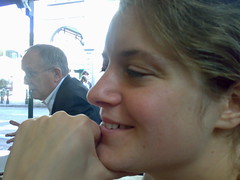At the moment, food seems to be the subject of much media debate here in the UK, and is possibly even a common topic in discussions between real people.
Mostly these are positive debates that look at aspects of food and people’s attitudes to it, but recently there is also a thread of the argument that says “Food is just functional. Just shut up and eat.”
In some ways this is a compelling argument. Comparing white balsamic vinegar with yuzu juice is a decadent pastime, spending hundreds of pounds on a meal is a shocking denial of the reality of our unfair world and a society that is simultaneously struggling with an obesity epidemic and fears about anorexic models is seriously dysfunctional. Perhaps we should just be grateful that we have enough to eat and be quiet about it.
Of course I don’t agree. Food fascinates me, not just because I love the experience of eating, enjoy the flavours and aromas, the textures and the satiety, but because it is so important in so many ways.
Every one needs to eat. The unfair way that our global food supply is distributed is largely a political issue. The methods used to produce our food help to shape the physical world we inhabit. Our cuisines are defined by our cultural history and much of the dynamics of family life, both positive and negative, revolve around food.
A Poetry Society publication that combines poetry and recipes stresses the positive aspects of both the cultural and psychological power of food - it is a lovely book, but its unrelenting cheerfulness left me wondering about whether poets ever write about the painful sides of food.
In Like Water for Chocolate, the heroine’s emotions are the most powerful ingredients in her cooking; this seems to me a more honest depiction of the way that food and self interact.
It is still incomplete, though: we can express emotion through cooking, but equally emotion can affect our experience of food. After a traumatic life event a couple of years ago, not only did I lose my appetite (though not my palate and enjoyment of food) for nearly a year, but my ability to tolerate sweetness and bitterness changed dramatically and permanently.
Perhaps we can think about Western society’s attitude to food as being like its attitude to women’s breasts. Their primary function of nourishing infants still exists, but in most people’s minds, for most of the time, it has been overlaid by the secondary function of sexuality and all the complex ramifications of that. A feminism that insists that breasts only exist to feed babies is trying to deny the reality of a vast layer of Western culture, and therefore failing to engage with the issues raised within that, even though in evolutionary terms it may be correct.
Similarly, food is fundamental for survival, but it has also come to serve many other important functions in our lives. Saying “just shut up and eat” may be tempting after one too many Sunday supplements proposing the merits of seasonal cooking or blueberries as a superfood, but it is a reductionist response to an interesting if sometimes overblown discourse.
Saturday, September 23, 2006
Subscribe to:
Post Comments (Atom)

4 comments:
your blog prompts me to offer this contribution to the discussion.
Eleven months ago a neighbour had pre-cancerous cells removed from his throat in a procedure which also removed some of the sensory bits in that area. He subsequently received both radio and chemo therapy. He spent the first five months being fed through a tube directly into his stomach before even contemplating using his mouth as an organ of the digestive system. He has not fully recovered his sense of taste and has been advised that he is unlikely to in the future. Eating carbohydrates like bread and potato gives the sensation of eating cement or sand. The acidity of most fruit renders this unpleasant as well.
In other words, here is a person who has permanently and physically lost the enjoyment of eating.
Having just polished off a plate of baked salmon, garlicky potatoes dauphinoise and some fresh green beans (from the mother in law's garden) the thought of not getting enjoyment from that experience is misery.
When the process of eating becomes purely functional then one reflects just how much food is a positive element in life.
As an aside, I am pleased to read that the poets presented a publication of 'unrelenting cheerfulness' I was under the impressions that poets moped around, slept with each others spouses and stuck their heads in ovens (is there a food connection there?)
These anti-Jamie Oliver activists seem relevant.
There are people out there trying to demonstrate the existence of god by assigning reality to subjective and emotional responses without being anti-science but for the more dismally inclined Maslow says just why reason is not on the side of the "shut up and eat" tendency.
Jack, care to expand on that a tiny bit - especially the reference to Maslow? A link would be helpful.
I just read an essay on PopMatters that addresses exactly what your blog entry says...
www.popmatters.com/features/060815-foodporn.shtml
Suz Haniote
Post a Comment